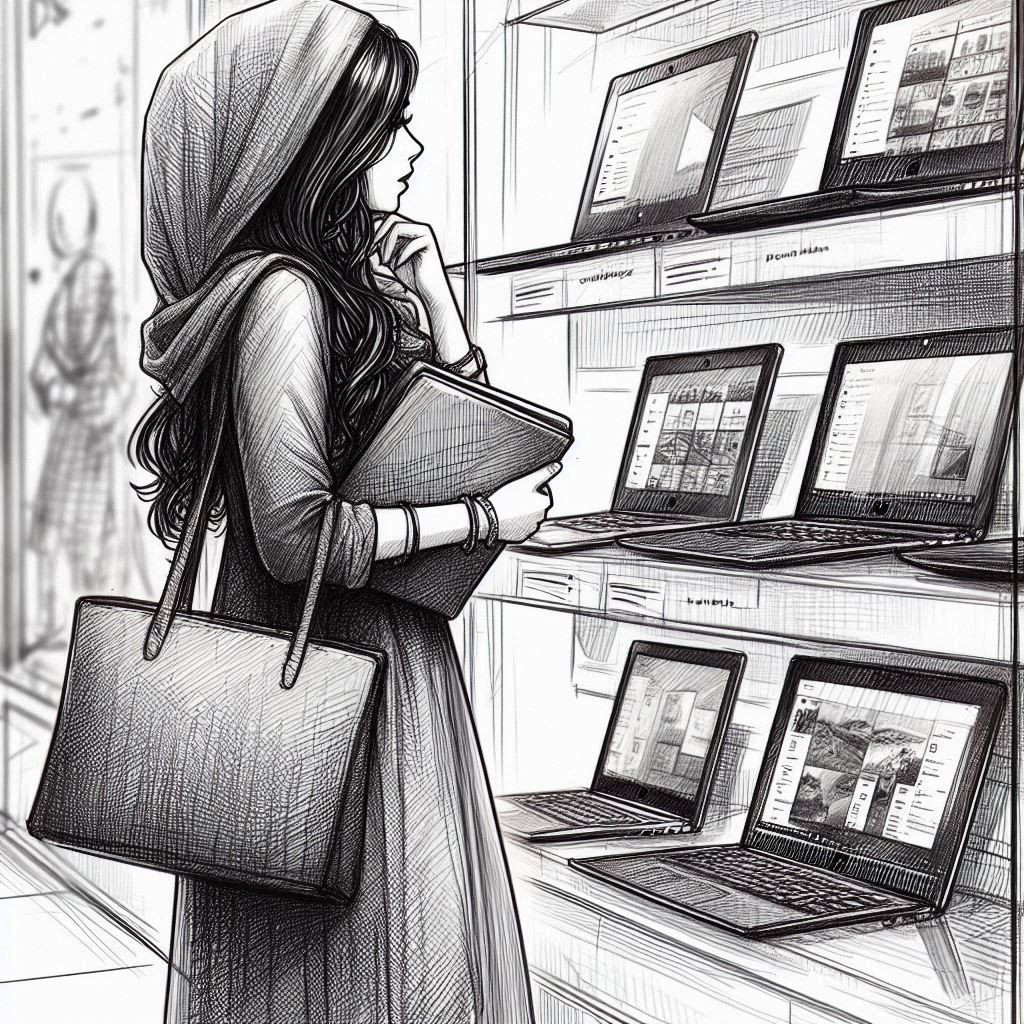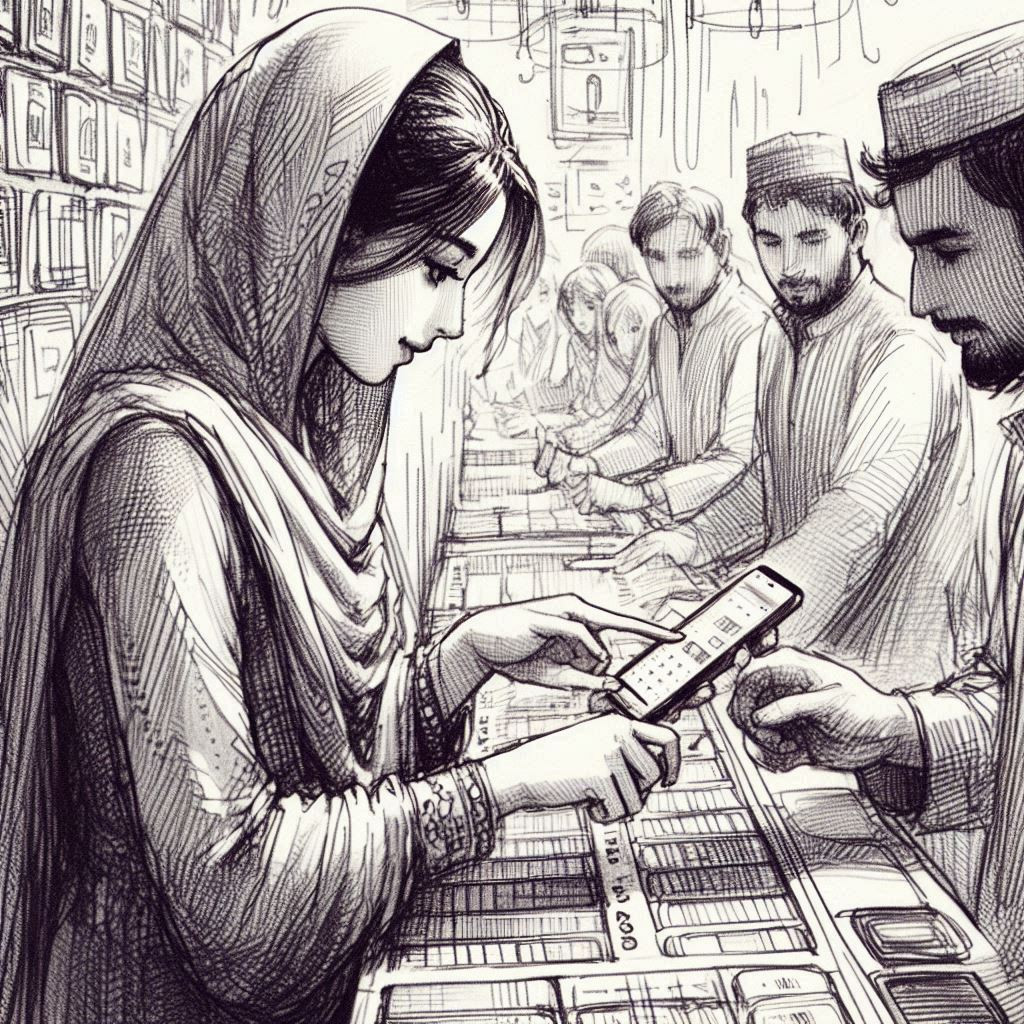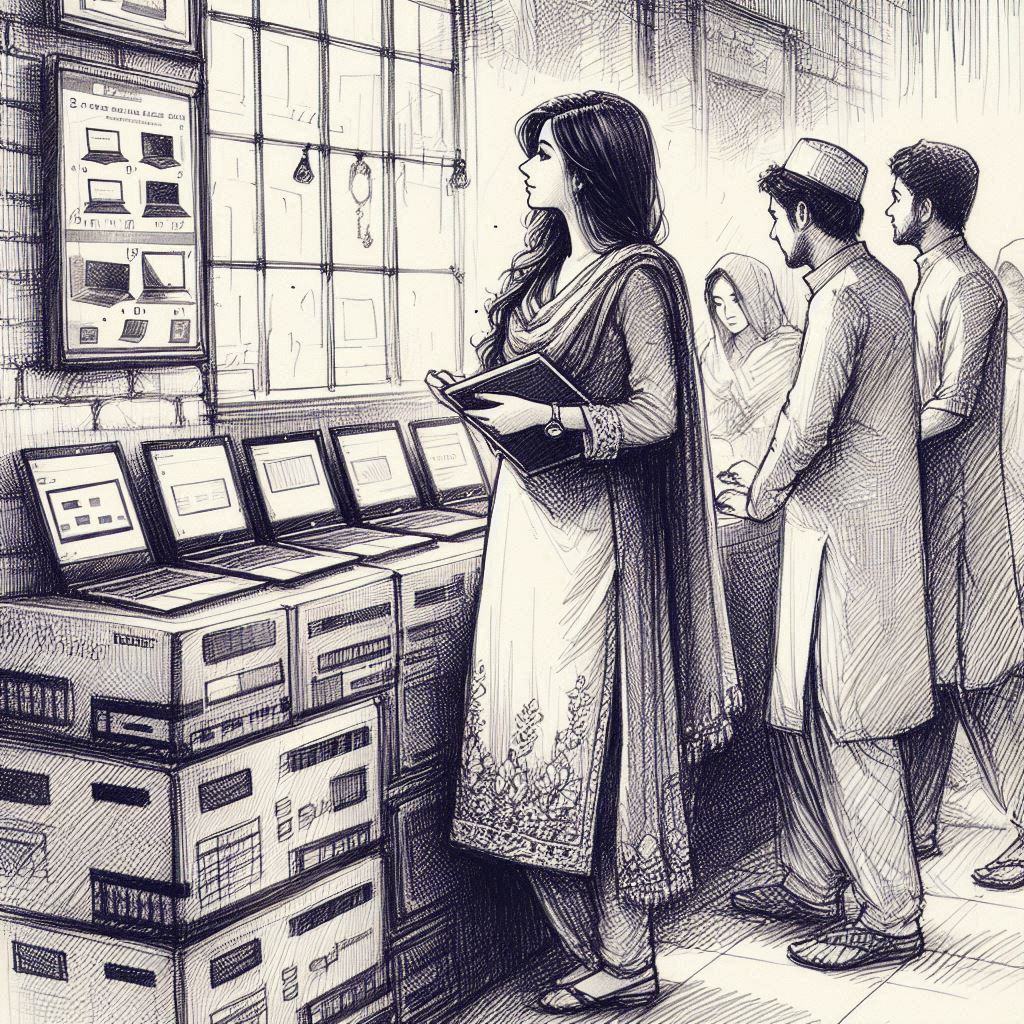As I walked through the small 4x4 cabins inside the narrow lanes of the mobile market in Saddar, Karachi, I could see fans whirring, some shops are air-conditioned and slightly bigger than the small cabins.
I also saw the crowded market full of men with mainly two types of expressions on their faces. Intent or purposeful for whatever they have come to accomplish here, and placid ─ the customers fall in the first category and shopkeepers in the second. The latter remain calm because of their knowledge of selling their goods and to save their energy to tackle all kinds of customer requests through the days.
The only time their expression changes is when they spot a woman in this space that is unofficially marked as a male-only space. It seems that way because not one woman is to be seen anywhere in, near or around this market, and hence the confused expressions when they spot one.
The confused expression might change into one of curiosity in case of customers, but for the shopkeepers, it is masked with polite but an oddly reserved demeanour bordering on their discomfort. When you engage with a shopkeeper/salesman with a perfectly valid query, you realise that they will respect you for being women [full credit for that], but as far as your query is concerned, the question written all over their face is “what is she talking about?” and “why is she even here?”
In 2014, I had my first experience going to the mobile/electronics market in Karachi to get my digital camera repaired, the one thing I noticed in the very first few minutes after entering was that women there were not welcome. I felt as though I was an alien.

Whereas women walking through any other market or bazaar are inevitably hailed and invited to check out their shops goods. “Baji, yahan ajayen,” or “Aunty, kya chahiye apko?” is bowled at you from nearly all shops, so much so that you sometimes get tempted to buy something that you don’t really need or forget what you really went there for. Yes, it is a confession that us women are like that. Now if the electronic market shopkeepers would just tap in on our shopping potential like this, they would probably sell more cameras, mobile phones and laptops than they could imagine in their stuck-in-time reticent selves.
Women often face not only unwelcoming attitudes from shopkeepers in markets but also encounter condescension when discussing technical issues, such as problems with their laptops or requests for upgraded mobile phones.
Forward to 2024, *Farheen who works from home, recently visited the laptop market at Regal, in Saddar, Karachi.
“Accompanied by a staff member borrowed from my dad’s office, I stopped at a shop and showed them my laptop which needed repair,” she recounts. “I told him that the laptop works well for about an hour and then switches off. It won’t switch on until a few hours have passed. I didn’t drop it or anything. Also, I have had Windows reinstalled. But the problem persists. Can you check what is wrong?”

The shopkeeper, a youngish fellow, gingerly took the laptop from her and turned it on.
“Nothing wrong with this, dekhen bilkul sahi chal raha hai,” he said, eyes glued to the screen.
Farheen repeated her story again, explaining that it has become unreliable and this way she had already missed an online class and could not afford to miss her work deadlines.
With his eyes still on the laptop, he said that he would reinstall Windows. “But I have already had that done,” she repeated.
“Yes, but when I install it, it will be different,” he said, looking up at her for half a second, knowing well how to use eye contact to validate his reply, but sly enough not to give Farheen the benefit of eye contact to validate her laptop problem.
“Ok, so how long will that take?” she asked, giving in to the inert attitude.
“Just 15 or 20 minutes,” he replied, his eyes on the laptop.
“Fine, I’ll return in a bit,” she said and wondered off to look at the other shops.
Farheen had made up her mind to purchase a new one and keep the old one as a back-up once it is repaired. The shopkeeper may not think how important it was for her to get the laptop repaired urgently, but she knew that she couldn’t afford to miss deadlines or her online classes.
Browsing through other shops she realised that the shopkeepers only talked to her male companion and would answer her queries looking at him. Fine with me, as long as I can get the right machine for the right price, Farheen thought.

She bought a new laptop and in about 30 minutes returned to the shop where she had given her laptop to be repaired. The shopkeeper looked at the laptop and told her that it wasn’t working and had just gone off and he hadn’t been able to reinstall Windows.
Finally, the penny has dropped, Farheen thought. “This is exactly what I told you,” she said, dying to but trying her best not to go ‘I told you so’ on him. “It is unreliable and needs to be looked at.”
Finally, he took the machine in for repair, predicting it to be a motherboard issue.
***
An issue like this at the tailors’ or in a grocery store would have been quick and smooth because I suppose, that is an area perceived as socially acceptable for women to venture into.
Since women quite enjoy being treated like ace customers in other markets and bazaars, for the life of me, I cannot understand why the electronics market is an unofficial no-go zone for women. A market be it for mobiles or computers caters to almost the same needs of men and women as the users are more or less equal in number and have the same kind of issues, for a laptop or a mobile phone that has stopped working and needs repair or an upgrade. Why the discrimination in the market premises when a woman steps inside to get a device repaired or to purchase a new one?
“It is said to be a male-dominated market since ever,” says Aneesa Azmi who lives in Saddar, Karachi and has been going to a specific shop since the last 30 years. “If I recall correctly, Rainbow Centre and other markets were only for men where they could get cassette/CD players or their Walkmans repaired. The trend and perception never changed, but devices got upgraded to mobile phones, digital cameras and laptops.”
Azmi shares that her brother introduced her to a shopkeeper who used to deal in new and used devices, and knows several others who can help with repair, so she never had to worry about going to any market.
But the situation is not the same for those women who do not have any male member of the family to take them or go instead of them.
Depending on male members of the family can also delay getting something fixed or the issue may not resolve properly as it goes indirectly through a second person.
“The first laptop I got was my elder sister’s old one when she upgraded to a new machine,” says Iqra Saleem. “It would break every few months and I had to ask my brother to get it fixed. He would only get Sundays off from work when the market is closed. It not only became inconvenient, but my brother told me very clearly that the market is not for girls.”
Sometimes she would have to wait 2-3 weeks until her laptop got fixed.
It is not that the markets have put up a notice or there are entry restrictions, it just appears that men are bit territorial about electronics and women feel unwelcome like pariahs.
“At first it was an uncomfortable feeling but then I realised I was not doing anything wrong and I had to get my device fixed because I could not delay the submission of my thesis,” says Saleem. “I decided to go myself and after some time, I got used to the stares and questioning faces.” Eventually, she found her way through and made some contacts there who she could call to find out about shop timings etc.
The question arising in my mind is that if the market is not restricted to men, and half of the repairs are coming from women as well, why is the atmosphere thickened for women to go to such markets?
The main issue seems to be the engraved masculinity or mail dominance in our society, where it is believed that women just should stay home [making parathas for their tiffins] and their male members should get the chores done. With women now even filling fuels in cars and motorcyles on gas stations, let alone the footprint in IT and cellular network industry, solo visits to electronics markets shouldn’t really be a taboo.
The fact that their technical queries or issues are not considered valid or important reflects a broader issue of gender bias, where women’s competence and needs are frequently underestimated.
“When I went for the first time along with my male friend, most of the shopkeepers weren’t answering my queries and kept asking my friend to re-explain to them,” shares Saleem.
Women are looked down and discriminated in this sneaky and silent way not just in male-dominated markets but also in several other professional and personal spaces. Women having tea at roadside tea stalls (another male domain) are assumed to be “not a decent family”! Some places in posh localities are now considered “okay” but at majority of tea stalls, men will stare you down while calmly sipping their tea, until you decide to abandon your doodh-patti or scald your mouth gulping it down in a hurry to leave and get away from those eye boring holes in you.
In the continuous struggle to prove themselves worthy in the race, women must keep trying to move forward with their heads high and conquer the world.
“In my early days as a reporter, many spaces were not welcoming for] female reporters, for instance the media cells of religious political parties,” recalls Saleem. “Eventually, over time they started acknowledging my work ethics and professionalism. Public protests or rallies are mostly another male domain and I would often hear from them that a male reporter should have been sent instead. Why should I give my work to a male colleague just because the space isn’t welcoming for women?”
The boundary and limit for women to get into these grooves need extra effort. The discussion about space and boundaries is nothing new, but over the years women’s’ needs, their numbers and participation, and the rest of the world has changed, a lot. Does it still intrigue, thrill or kill men to see a woman who knows her mobile phone or laptop? Move on, move over and move up!
*Name changed to protect privacy
